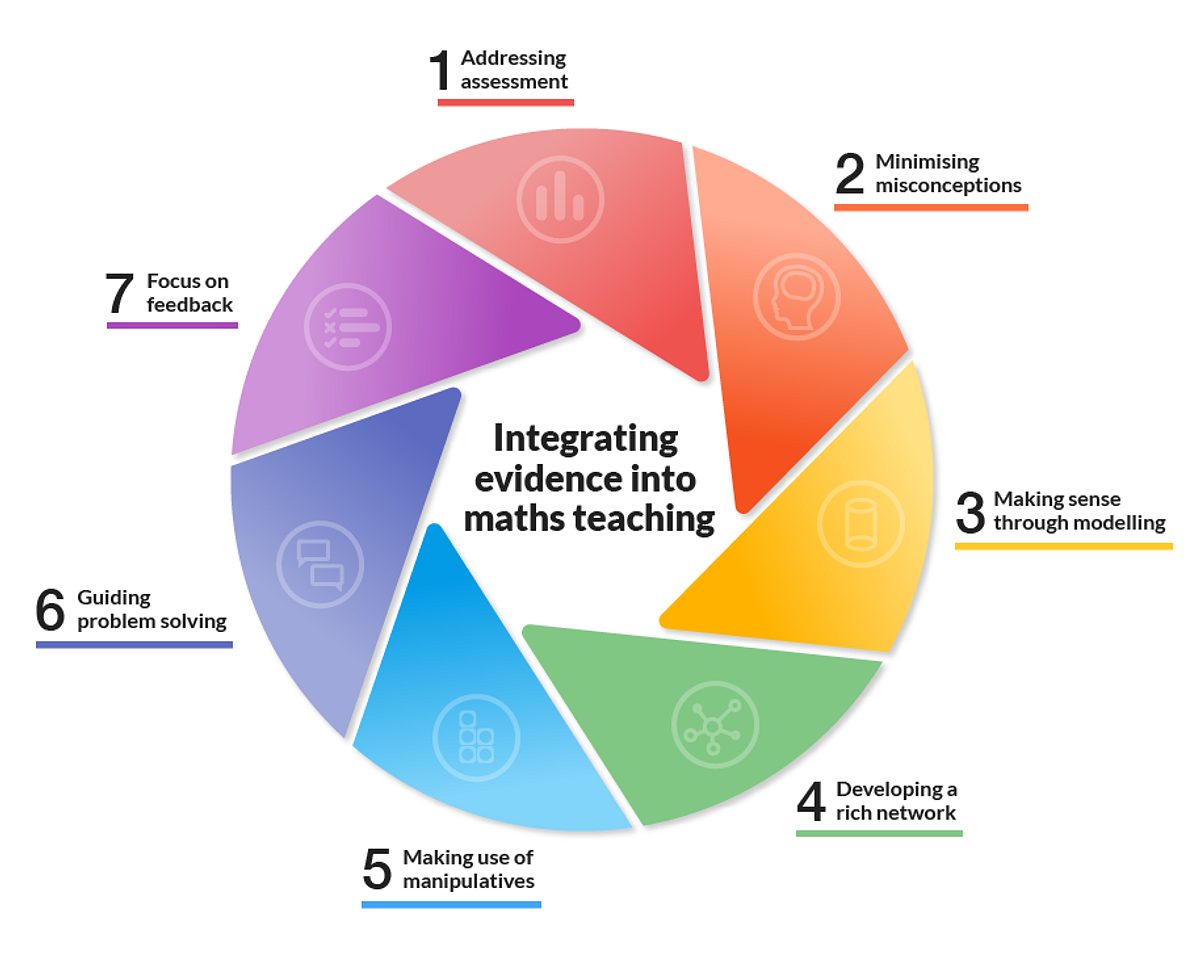This new monthly series supports teachers and maths leads in implementing the evidence from the EEF’s Improving mathematics in Key Stages 2 and 3 guidance report. The first in the series of 7 focuses on assessment.

What are your existing beliefs and assumptions about assessment in mathematics?
- What is the purpose of assessing a pupil’s mathematical understanding?
- When thinking of ‘assessment’, do you usually think of formal written tests? Or something else?
- Is the data you collect genuinely useful in deciding what next steps pupils need to take?
- Do your written assessments allow you to pinpoint exactly what difficulties each child has?
If all teachers of mathematics in your school were asked these questions, would there be broad agreement in their answers?
As always, it is helpful to consider the evidence base in order to guide our thinking
The reality is that assessment in our mathematics lessons probably serves multiple purposes: the tracking of pupil progress for school-level decision-making; the identification of ideas and concepts requiring revisiting or re-teaching; and the highlighting of misunderstandings or misconceptions needing targeted individual support.
The pandemic has brought additional challenges: while some diagnostic assessment tasks may be relatively straightforward to set remotely, acting upon the findings is certainly considerably more of a challenge.
As always, it is helpful to consider the evidence base in order to guide our thinking. Our guidance report, based on an extensive review of the evidence on teaching KS2 and 3 mathematics, found that:
- Assessment should be used not only to track learning but also to provide information about what pupils do and do not know, which should inform the planning of future lessons and identify which pupils should be the focus of targeted support
- It is quite possible for pupils to have strengths in one component of mathematics and weaknesses in another
- Formal tests can be useful, but low-stakes quizzes, informal observations of pupils, and discussion are also valuable
- We should ensure that pupils develop fluent recall and quick retrieval of number facts – this will support understanding of concepts encountered later on
If we’re serious about re-thinking our practices, it is desirable to provide regular time for teachers and leaders to discuss assessment practices
Shifting the assessment conversation
We’ve come a long way since observers expected to ‘see progress’ in a 20-minute lesson drop-in. Learning is messy and notoriously difficult to observe. Pupils may seem to grasp a mathematical concept in one context, only to act as if they have never encountered the idea before when it is presented in another
Accurate, meaningful assessment is therefore challenging, and a range of different assessment types – over a significant period of time – are needed to build up a picture of a pupil’s mathematical understanding. Strong relationships and a thorough mathematical understanding of our pupils are key to this – as are accurate judgments made outside of the glare of direct accountability
Questioning is key, and formative assessment techniques including exit passes, hinge-point questions, mini whiteboards, and ranking exemplars are useful pieces of the assessment jigsaw. As is always the case, effective implementation of these ideas is key to driving forward improvement across a department or school.
Providing time for reflection
The collection of data in spreadsheets is occasionally unavoidable, but spreadsheets cannot possibly tell us a mathematical story; they cannot identify and correctly diagnose the difficulties of the struggling child in the way that an expert mathematics teacher can do.
If we’re serious about re-thinking our practices, it is desirable to provide regular time for teachers and leaders to discuss assessment practices – from the questions we ask in lessons, via the techniques for ‘in-the-moment’ decision-making, to the outcomes of formal written assessments
Increasing the use of open-ended questioning when solving mathematical problems can provide numerous opportunities to assess understanding and decide upon next steps – books such as ‘Thinkers’ and ‘Questions and Prompts for Mathematical Thinking’ (and the Primary version) are useful in helping to foster a culture of high-quality task design and effective questioning across our team.
Time is valuable, but creative use of meetings or regular ring-fenced CPD time can really help – carefully planned, this time is often much more valuable than time spent on traditional marking.
Five ‘big questions’ for discussion
- What is the purpose of assessment in mathematics and is there a collective understanding of this across all teachers in your team?
- Is there an appropriate balance in your school between assessment to impact on learning and assessment to support school-level decision making?
- What assessment tasks – not just written tests – will give us the best diagnostic information about the knowledge, skills and competencies we want our students to develop through the mathematics curriculum?
- Do we have systems in place to support the regular discussion of assessment outcomes, including deciding on next steps and sharing teachers’ practices?
- How can we best sequence assessment tasks throughout the year to support both mathematical development and our school’s internal assessment cycles?
